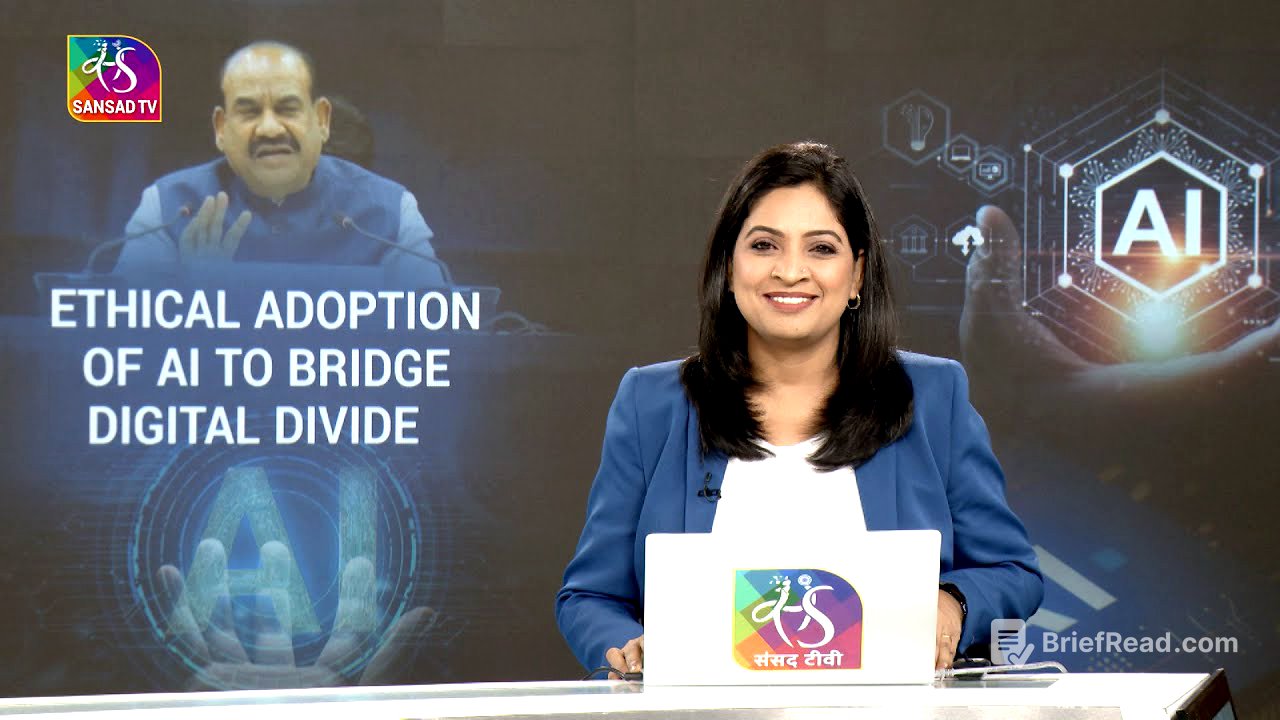TLDR;
This episode of Sansad TV's "Perspective" discusses the digital transformation of the Indian Parliament and the ethical considerations surrounding the use of artificial intelligence (AI) in governance. Lok Sabha Speaker Om Birla's address at the 68th Commonwealth Parliamentary Association Conference in Barbados is the starting point, emphasizing the need for responsible AI use and bridging the digital divide. The discussion covers initiatives like the AI-enabled e-library, speech-to-text reporting, and the Sansad Bhashini AI translation system.
- Digital empowerment is key to India's economic growth.
- Ethical AI usage is crucial to prevent bias and security risks.
- International cooperation is essential for knowledge sharing and capacity building.
- AI training and literacy programs are necessary for effective and responsible AI implementation.
- Regulatory frameworks are needed to address legal and ethical challenges posed by AI.
Digital Transformation in Indian Parliament [2:51]
MP Sujit Kumar highlights the significant adoption of technology in the Indian Parliament, citing the Bhashini initiative as a prime example. This allows MPs to speak in any of 11 official languages, translated in real-time using AI. He also mentions the move towards a paperless parliament, with digital filing of questions and bills. These changes have made parliamentary processes more efficient and inclusive.
AI-Enabled Library and Enhanced Parliamentary Effectiveness [5:38]
Sujit Kumar explains how the AI-enabled library has improved the effectiveness of MPs. Ministers can now instantly access previous answers given on the floor of the house, leading to better-informed debates. The e-library allows MPs to access parliamentary records and documents remotely, making research more convenient and efficient.
Ethical Use of AI in Democratic Institutions [7:58]
Advocate Kushbu Jen emphasizes the importance of ethical AI, highlighting potential challenges such as bias, lack of transparency, and security risks. She warns of systematic disruptions and targeted attacks on translation infrastructure, which could block communication and sow confusion. Jen stresses the need for security measures and ethical guidelines to ensure AI is used responsibly and fairly.
Global Cooperation and Knowledge Sharing [12:03]
Ambassador Suresh K. emphasizes the need for Commonwealth countries to cooperate and share knowledge to ensure technology serves as a bridge, not a barrier. He suggests India can offer training programs to other countries on digitalizing parliamentary processes, similar to workshops previously conducted for other nations. He also points out that India, as a democratic nation with advanced digital technologies, can be a recognizable entity in promoting ethical AI globally.
AI Training and Literacy Programs [15:31]
Kushbu Jen discusses the AI and governance training programs launched by the National e-Governance Division, in partnership with IIT Delhi. These programs aim to build capacity among government officials and parliamentary staff, covering AI policy frameworks, ethical considerations, and hands-on use cases. She also highlights the importance of human oversight in AI decision-making to prevent bias and ensure accountability.
Ethical Frameworks for AI in the Indian Context [18:28]
Sujit Kumar mentions training programs by the Parliamentary Research Institute for Developing Economies (PRIDE) for MPs and professionals. He also notes the government's investment in the India AI mission, aiming to take AI to schools across the country. Kumar discusses ethical concerns around AI, citing examples like the ITAT Bangalore case where a chatbot hallucinated judgments, and the case of a teenager who committed suicide after being influenced by an AI model. He argues for defining legal personhood for AI and developing robust regulatory frameworks to address AI-enabled offenses.
Promoting Ethical AI for the Greater Good [23:51]
Ambassador Suresh K. expresses skepticism about the term "ethical AI," arguing that AI is neutral and its ethics depend on the user. He suggests focusing on how AI can be used to our advantage, with ethics being a human-centric consideration. He reiterates the importance of training programs and international cooperation to develop Indian connections and leverage AI for the benefit of humanity. The key message is that AI tools must remain human-centric and serve to unite societies.








